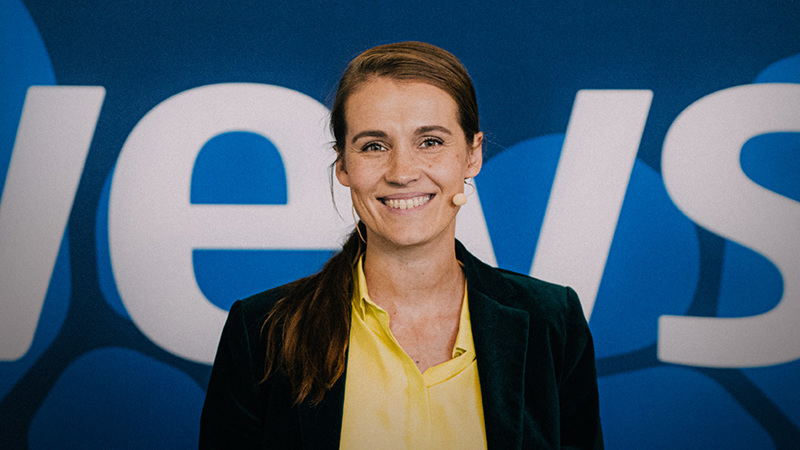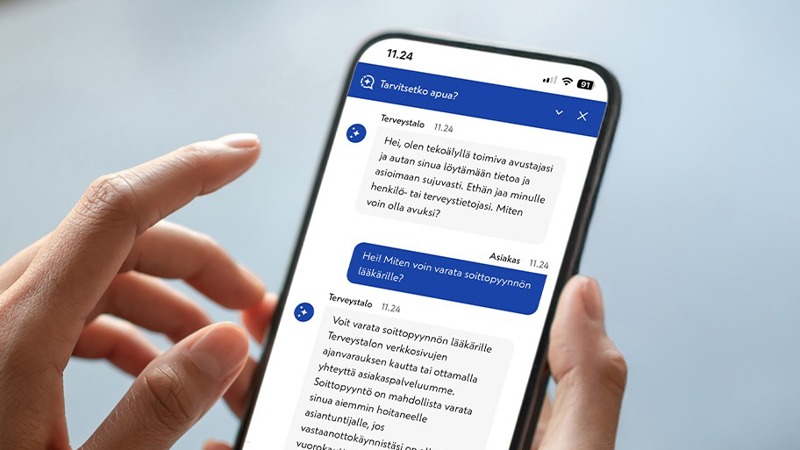In the future, technology is an enabler and team problem-solving skills a way to success
We live in an era of uncertainty and rapid technological development. Generative AI will be on everyone's radar in 2023, and organisations are wondering how AI will change the way they work and do things. The rapid evolution of technology poses challenges, but at the same time creates opportunities. At Terveystalo's Future Workplace Makers event, Maria Ritola, technology influencer and founder of Iris.ai, shared her insights on how to build a good working life and harness technology to help people do their jobs.

With a rapidly changing environment and increasing uncertainty, it is easy to become a bystander and rely on familiar patterns. But instead of being timid, Ritola encourages us to be awake to the rapid technological revolution and jump on the bandwagon of change so that we can harness it on the road to the future we want.
– One common denominator in the era we live in is increasing uncertainty, and this may be accompanied by strong feelings such as whether I belong or how to keep up. Change is knocking at the door and that knock will turn into a knock on the door if we do not invite change in and try to understand what it is all about. Many people have told us they fear for their jobs. Certainly, many ways of doing a job will change through technological advances, but this does not mean the end of the job. On the contrary, work has always been about solving problems, and we are not short of problems. The ways of solving problems are evolving, as the trend in artificial intelligence is now showing us, and so must the ways of solving them, because the usual approaches are not enough in an era of fast-changing situations and multi-dimensional challenges.
The rapid pace of development means that we are in a situation where regulation is struggling to keep pace with innovation. Organisations should therefore be particularly alert to this and analyse the impact of technological choices in a broad context.
In an uncertain and fast-changing environment, you need to be able to react and solve problems flexibly. It is clear that such problem-solving is best done when there are people around you with whom to explore options. Are we investing in how people work together? Do we know what makes for quality interactions? These are questions that organisations need to ask themselves now, as teamwork and the integration of cross-disciplinary skills become increasingly important in the workplace. “
Technology influencer Maria Ritola
Technology plays a supporting role
Where do machine and human intelligence meet? Ritola points out that machines are becoming adept at a number of tasks, such as data collection, analytics and forecasting. This will free up people's time for new things. This is a good thing, as the problems to be solved are more complex, systemic in nature. We humans need to strengthen certain skills to be able to create wisely going forward.
– Interaction skills are at the heart of these skills. For example, the Harvard Business Review published a report on this recently. It found that the amount of interaction in organisations has increased by an average of 50% over the past two decades. According to the study, in many organisations more than 75% of time is spent communicating with colleagues. There is a natural reason for this. In an uncertain environment and with rapidly changing situations, you need to be able to react and solve problems flexibly on the fly. Clearly, this kind of problem-solving is best done when there are people around to brainstorm options with.
– The CEO of Unilever recently said: 'The problems we face today are so big and so challenging that it is clear that we cannot solve them alone. We have to ask others to join us. Do we know how to ask and do we know what makes for quality interaction? Are we investing in how people work together? These are questions that organisations now need to ask themselves.
While location-independent working offers flexibility, working on a hybrid model does not necessarily support teams in all cases because of the different nature of interactions over the network. Problem solving requires continuous learning. In an organisation where work is done remotely and on a hybrid model, it is therefore necessary to invest in meetings and presence, and to train front-line staff in remote management skills.
Read more occupational health articles

What is metabolic age and why should you care about it?
A new laboratory study by Terveystalo reveals how your body is aging. Metabolic age makes biological aging visible.

Smooth assistance for your needs – our AI assistant is now at your service
You can now find Terveystalo’s AI assistant on our website — a quick and easy way to get answers based on the information available on our site. For now, the assistant is available only on the Finnish‑language section of our website, but you can chat with it in English.

How technology helps relieve mental stress: "When the load is high, the threshold must be low."
Mental health disorders have overtaken musculoskeletal disorders, which had long been the leading cause of sick leave. Work is changing, and the range of sick leave caused by mental health issues has also changed. We must be able to offer new solutions to this challenge.

Extensive data set of 200,000 samples: Nightingale study reveals link between illness risks and sick leave
Data from the Finnish Nightingale study, which is used in Terveystalo's occupational health services, reveals a clear link between lifestyle-related health risks and sick leave. The exceptionally extensive data set of over 200,000 customers shows that people with a low risk of illness had significantly fewer absences, while those in high-risk groups had more absences. The results highlight the importance of preventive healthcare in ensuring work ability and the competitiveness of companies.

Strong identification speeds up your service experience when calling us
Soon you can identify yourself easily and securely before your call is answered. Read below to see how the identification process works.

Terveystalo's digital services have been awarded the internationally recognized ISO27001 information security certification.
Terveystalo's information security practices, processes, and risk management are in line with international best practices.